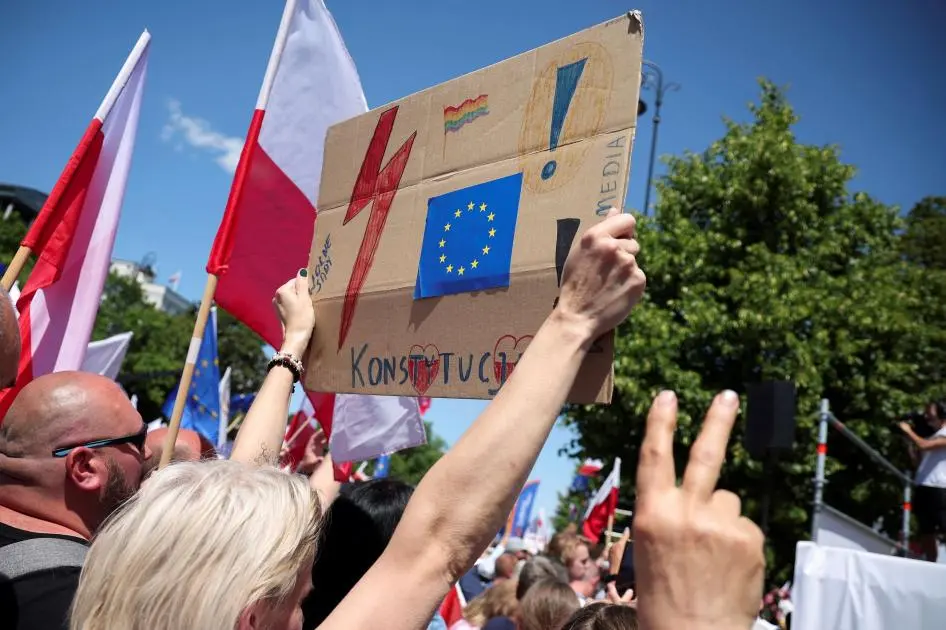Renewed commitments by the European Union and its member states to uphold and protect human rights in 2023 have still not been translated into practice, Human Rights Watch said today in its 2024 World Report.
EU migration policies have contributed to deaths, torture and abuse. EU states have failed to combat attacks and structural discrimination against members of marginalized communities. The EU has failed to respond to increasing restrictions imposed by member states on the rule of law and civil society and has demonstrated “double standards” in its foreign policy.
“There is a troubling gap between the EU’s human rights commitments and its practices, and citizens are paying the price,” said Benjamin Ward, deputy Europe and Central Asia director at Human Rights Watch. “If the EU aspires to be a model for human rights in a troubled world, it must prioritize rights in practice, not just on paper. »
In its World Report 2024, its 34th edition which has 740 pages, Human Rights Watch analyzes human rights practices in more than 100 countries. In her introductory essay, Executive Director Tirana Hassan argues that 2023 has been a fraught year, not only because of the repression of human rights and atrocities linked to armed conflict, but also because of selective outrage and transactional diplomacy. These government practices, she indicates, have profoundly undermined the rights of all those left on the sidelines of unacknowledged “deals”. A different and hopeful path is possible, she says, however, calling on governments to remain consistent in respecting their human rights obligations.
Faced with the increase in the number of people arriving at its borders, the EU and its member states have stepped up repressive deterrent measures and alliances with abusive countries. More than 2,500 people have died at sea trying to reach the EU, highlighting the deadly consequences of the EU’s approach to boat migration.
EU member states including Bulgaria, Croatia, Poland, Greece, Hungary, Lithuania and Latvia have carried out illegal pushbacks at the external borders. Malta and Italy have facilitated interceptions at sea by Libyan forces, while EU institutions have increased their complicity in abuses, including torture, against migrants and refugees returned to Libya. Italy has signed an agreement with Albania to detain people rescued at sea by Italian ships, including asylum seekers, in that country.
Concerns about the decline of democratic freedoms and the shrinking space for civil society have persisted within the EU. Hungary and Poland continued to face scrutiny under Article 7 of the Treaty on European Union due to their governments’ disregard for EU values. However, despite pressure from the European Parliament and civil society, EU member states have refrained from taking decisive action against these two countries. Although the results of Poland’s October elections offer prospects for reform, EU engagement remains vital until a new government makes changes, Human Rights Watch said.
EU institutions have failed to respond sufficiently to the worrying trend of EU member states other than Hungary and Poland imposing unjustified restrictions on civil society, notably Greece, France and Poland. ‘Italy. Instead, legislative initiatives at EU level, such as the Defense of Democracy package, have raised new concerns about potential stigmatizing and dissuasive effects on civil society, both nationally and internationally. the foreigner.
After the Hamas attack in Israel on October 7 and the ensuing hostilities in Gaza, anti-Semitism and Islamophobia increased in Europe. Yet responses from EU member states have been inadequate, with some imposing new discriminatory and abusive measures against people identified or perceived as Arab, Palestinian and Muslim, including pressure for more restrictive immigration policies.
EU data from June shows that 95.3 million people – 21.6% of the population – were “at risk of poverty or social exclusion” in 2022, making it more difficult to exercise their rights. The previous year’s high inflation rates have fallen in 2023, and the impact of the cost of living crisis has diminished in part thanks to government mitigation measures. A European Commission report also highlighted the obstacles faced by marginalized groups in accessing public services essential to exercising their rights, including for homeless people, Roma, people with disabilities and single-parent families – mainly led by women.
Growing perceptions of double standards have marred EU foreign policy in 2023. It must be acknowledged that the EU has maintained its support for Ukraine and its efforts to ensure accountability those responsible for war crimes and other egregious violations committed in Ukraine by Russian forces since Russia’s large-scale invasion of the country. However, the EU’s position on the conflict in Gaza and Israel has ignored calls for accountability for crimes committed by all sides.
The EU’s deal with Tunisia, promising financial support in exchange for migration cooperation despite serious risks for refugees and asylum seekers, illustrates its increasingly transactional diplomacy, leading to silence or support of abusive governments in the vain hope of short-term profits. The EU has played a leading role on key UN Human Rights Council resolutions, but has not insisted on the resumption of the review of Libya, nor supported any follow-up to a damning investigation into Ethiopia.
This article is originally published on .hrw.org








